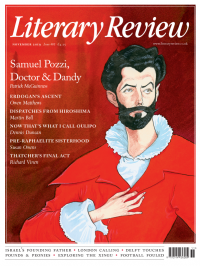Cornelius Dieckmann
Roman Holiday
Find Me
By André Aciman
Faber & Faber 260pp £14.99
One of the most moving passages in André Aciman’s 2007 novel Call Me by Your Name is a heart-to-heart between father and son at a moment when seemingly all is said and done. Elio Perlman, the seventeen-year-old protagonist, has just bid a tearful farewell to Oliver, the young academic who has spent the summer at the Perlmans’ estate on the Italian Riviera working as an assistant to Samuel, Elio’s father. After a tempestuous but secretive love affair, capped off by a quasi-elopement to Rome, Oliver must return to his teaching job in New York, leaving Elio heartbroken.
In a solemn postmortem of that summer of love, Samuel reveals to his son that he’s known about the relationship for some time, and even felt some second-hand pride at its youthful honesty. ‘I don’t envy the pain. But I envy you the pain,’ he tells Elio. ‘If there is a flame, don’t snuff it out, don’t be brutal with it … We rip out so much of ourselves to be cured of things faster than we should that we go bankrupt by the age of thirty.’ His advice, though generous, is also an admission of inexperience. To assure Elio that what he’s feeling is something exceedingly rare, Samuel confides, ‘I may have come close, but I never had what you had.’
In Find Me, Samuel has found it. The sequel to Call Me by Your Name (much anticipated, in no small part thanks to Luca Guadagnino’s 2017 film adaptation) begins on a train to Rome, the city in which Elio and Oliver’s relationship ended ten years earlier. Rather than follow the temptation of returning immediately to their story, however, Aciman focuses on Elio’s father for the first half of the book. On his way to a reading, Samuel meets Miranda, a woman about his son’s age, with whom he begins a head-over-heels relationship.
The silver-haired male intellectual falling for the beautiful young woman is a cliché almost as old as Rome, and the parties involved know it. Miranda even mocks Samuel by guessing – probably not inaccurately – that he dreams of ‘traipsing through the Aeolian Islands … swimming at dawn, writing all day, eating from the sea, drinking Sicilian wine at night with someone half your age’. Despite such knowing disclaimers, Samuel and Miranda’s romance ultimately seems rehearsed, and professions of love like ‘You’re oxygen to me, and I’ve been living off methane’ tip the story towards kitsch.
Still, there are moments in Find Me that come close to the unforced intimacy of its predecessor, particularly when Aciman plays with the callousness of love’s timing. In the book’s second half, another decade has passed and Elio leads a cosmopolitan life as a pianist in Paris. He falls in love with Michel, a man twice his age, with whom he regains the desperate passion he last felt at seventeen. These lovers’ lives may be asynchronous, but bad timing at least allows the small romantic solace of
finding that we are each put in a position to complete the lives of others, to close the ledger they left open and play their last card for them. What could be more gratifying than to know that it will always be up to someone else to complete and round off our life?
Aciman’s characters are full of such wistful reflections. More than anything, they understand the pleasure of feeling thoroughly incomplete without someone who hasn’t yet seen your whole self – not because you’ve concealed your true colours from them but because you’ve managed to sustain the curiosity of a once-new relationship. Elio eventually confesses to Michel that for him, that someone has always been Oliver.
In Call Me by Your Name, Oliver teases Elio with the cryptic question ‘If not later, when?’ It’s that slightly patronising tone that made the novel so magnetic, but now that ‘later’ has arrived, as Oliver himself recognises, ‘The past, the future, what masks they are.’ Erotic urgency has merged with middle age’s frugality of heart. Love can run on both, yet the passages in which Oliver and Elio finally heed the imperative of the novel’s title don’t have the same fervour as Call Me by Your Name. Instead, here is the deep sigh of two decades aligning at last. The final section, set in Aciman’s native Alexandria, is called ‘Da Capo’, the musical command to repeat a particular passage from the beginning, retrieving what’s past but not lost. If Call Me by Your Name is summer, Find Me is autumn: the flame is still burning, but the heat has gone.

Sign Up to our newsletter
Receive free articles, highlights from the archive, news, details of prizes, and much more.@Lit_Review
Follow Literary Review on Twitter
Twitter Feed
Under its longest-serving editor, Graydon Carter, Vanity Fair was that rare thing – a New York society magazine that published serious journalism.
@PeterPeteryork looks at what Carter got right.
Peter York - Deluxe Editions
Peter York: Deluxe Editions - When the Going Was Good: An Editor’s Adventures During the Last Golden Age of Magazines by Graydon Carter
literaryreview.co.uk
Henry James returned to America in 1904 with three objectives: to see his brother William, to deliver a series of lectures on Balzac, and to gather material for a pair of books about modern America.
Peter Rose follows James out west.
Peter Rose - The Restless Analyst
Peter Rose: The Restless Analyst - Henry James Comes Home: Rediscovering America in the Gilded Age by Peter Brooks...
literaryreview.co.uk
Vladimir Putin served his apprenticeship in the KGB toward the end of the Cold War, a period during which Western societies were infiltrated by so-called 'illegals'.
Piers Brendon examines how the culture of Soviet spycraft shaped his thinking.
Piers Brendon - Tinker, Tailor, Sleeper, Troll
Piers Brendon: Tinker, Tailor, Sleeper, Troll - The Illegals: Russia’s Most Audacious Spies and the Plot to Infiltrate the West by Shaun Walker
literaryreview.co.uk